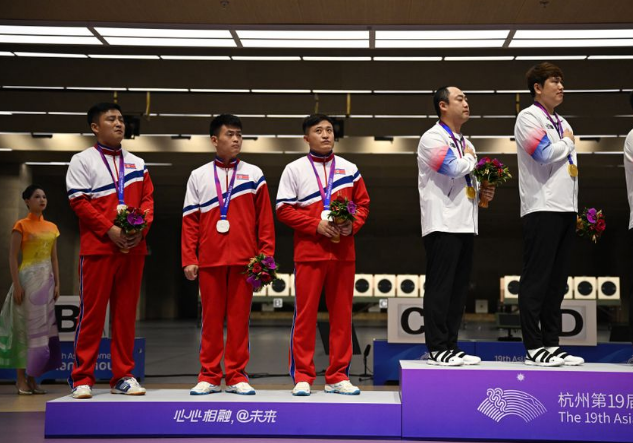In a notable departure from tradition, the North Korean athletes initially declined to face the flag during the rendition of South Korea’s national anthem, despite customary practice. Subsequently, during the customary group photo session where all medal winners assemble for photographs, the bronze medalists from Indonesia joined South Korea on the top podium, adhering to the convention. However, the three North Korean athletes, namely Kwon Kwang-il, Pak Myong-won, and Songjun Yu, chose not to join the assembly.
This brief yet awkward episode led to an exchange between one of the South Korean athletes and their North Korean counterparts. Despite efforts by the South Koreans to engage in conversation, the North Koreans remained silent and did not acknowledge their rivals standing to their left.
This podium drama unfolded at the Fuyang Yinhu Sports Centre, located on the outskirts of the eastern Chinese city of Hangzhou. It marks the latest controversy involving the North Korean team at the Hangzhou Asian Games.
A day before this incident, the Olympic Council of Asia (OCA) confirmed its decision to allow the North Korean flag to remain displayed at the Games, despite its earlier ban due to the country’s non-compliance with global anti-doping regulations. This decision to maintain the North Korean flag’s presence highlights the unique circumstances surrounding the country’s participation in international sporting events.
The Hangzhou Asian Games represents North Korea’s return to international multi-sport events since its participation in the 2018 edition held in Jakarta. Notably, North Korea faced suspension from the International Olympic Committee (IOC) until the conclusion of 2022. This suspension resulted in the country’s absence from the 2022 Beijing Winter Games, following its failure to send a team to the Summer Olympics in Tokyo.
The Korean Peninsula remains in a unique and unresolved status, as the 1950-1953 Korean War concluded with an armistice rather than a formal peace treaty. Consequently, North and South Korea remain technically at war, and this historical context adds complexity to their interactions on the international stage.








 India
India












